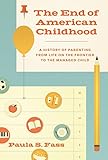The End of American Childhood : A History of Parenting from Life on the Frontier to the Managed Child / Paula S. Fass.
Material type: TextPublisher: Princeton, NJ : Princeton University Press, [2016]Copyright date: ©2018Description: 1 online resource (352 p.) : 23 b/w illusContent type:
TextPublisher: Princeton, NJ : Princeton University Press, [2016]Copyright date: ©2018Description: 1 online resource (352 p.) : 23 b/w illusContent type: - 9780691162577
- 9781400880430
- Children -- United States -- History
- Families -- United States -- History
- Parenting -- United States -- History
- HISTORY / Social History
- Adolescence
- Adoption
- Adult
- Advertising
- African Americans
- Alexis de Tocqueville
- American Dream
- American Vision
- Americans
- Aunt
- Benjamin Spock
- Bilkent University
- Birth control
- Career
- Center for Advanced Study in the Behavioral Sciences
- Child abuse
- Child care
- Child development
- Child mortality
- Child savers
- Childhood
- Children's rights
- Classroom
- Claude Steele
- Culture of the United States
- Developmental psychology
- Early childhood
- Edith Abbott
- Erik Erikson
- G. Stanley Hall
- Gender role
- Grace Abbott
- Grandparent
- Grief
- Harriet Beecher Stowe
- Harvard University Press
- His Family
- Household
- Immigration
- Indulgence
- Industrialisation
- Infant
- Institution
- Jane Addams
- Jews
- John Dewey
- Juvenile court
- Juvenile delinquency
- Kastamonu University
- Kate Douglas Wiggin
- Latin America
- Lecture
- Literacy
- Literature
- Margaret Mead
- Marriage
- Middle class
- Mother
- Mrs
- National Association for the Advancement of Colored People
- National Child Labor Committee
- Neglect
- New media
- Newspaper
- Obedience (human behavior)
- Of Education
- Oxford University Press
- Palo Alto University
- Parent
- Parenting
- Patriarchy
- Philosopher
- Physician
- Politics
- Popular culture
- Profession
- Progressive education
- Psychiatrist
- Psychoanalysis
- Psychologist
- Psychology
- Public school (United Kingdom)
- Racial segregation in the United States
- Requirement
- Rutgers University
- Sibling
- Sigmund Freud
- Slavery
- Social science
- Society of the United States
- Society
- Sociology
- Tel Aviv University
- To This Day
- Toilet training
- University of California, Berkeley
- University of Victoria
- Wealth
- World War II
- Youth
- 306.850973 23
- online - DeGruyter
| Item type | Current library | Call number | URL | Status | Notes | Barcode | |
|---|---|---|---|---|---|---|---|
 eBook
eBook
|
Biblioteca "Angelicum" Pont. Univ. S.Tommaso d'Aquino Nuvola online | online - DeGruyter (Browse shelf(Opens below)) | Online access | Not for loan (Accesso limitato) | Accesso per gli utenti autorizzati / Access for authorized users | (dgr)9781400880430 |
Frontmatter -- Contents -- Acknowledgments -- Introduction: Young in America -- Childhood and Parenting in the New Republic. Sowing the Seeds of Independence, 1800–1860 -- 2. Children Adrift. Responding to Crisis, 1850–1890 -- 3. What Mother Needs to Know. The New Science of Childhood, 1890–1940 -- 4. A Wider World. Adolescence, Immigration, and Schooling, 1920–1960 -- 5. All Our Children. Race, Rebellion, and Social Change, 1950–1990 -- What’s the Matter with Kids Today? -- Epilogue -- Notes -- Suggestions for Further Reading -- Index
restricted access online access with authorization star
http://purl.org/coar/access_right/c_16ec
The End of American Childhood takes a sweeping look at the history of American childhood and parenting, from the nation's founding to the present day. Renowned historian Paula Fass shows how, since the beginning of the American republic, independence, self-definition, and individual success have informed Americans' attitudes toward children. But as parents today hover over every detail of their children's lives, are the qualities that once made American childhood special still desired or possible? Placing the experiences of children and parents against the backdrop of social, political, and cultural shifts, Fass challenges Americans to reconnect with the beliefs that set the American understanding of childhood apart from the rest of the world.Fass examines how freer relationships between American children and parents transformed the national culture, altered generational relationships among immigrants, helped create a new science of child development, and promoted a revolution in modern schooling. She looks at the childhoods of icons including Margaret Mead and Ulysses S. Grant—who, as an eleven-year-old, was in charge of his father's fields and explored his rural Ohio countryside. Fass also features less well-known children like ten-year-old Rose Cohen, who worked in the drudgery of nineteenth-century factories. Bringing readers into the present, Fass argues that current American conditions and policies have made adolescence socially irrelevant and altered children's road to maturity, while parental oversight threatens children's competence and initiative.Showing how American parenting has been firmly linked to historical changes, The End of American Childhood considers what implications this might hold for the nation's future.
Mode of access: Internet via World Wide Web.
In English.
Description based on online resource; title from PDF title page (publisher's Web site, viewed 01. Dez 2022)


